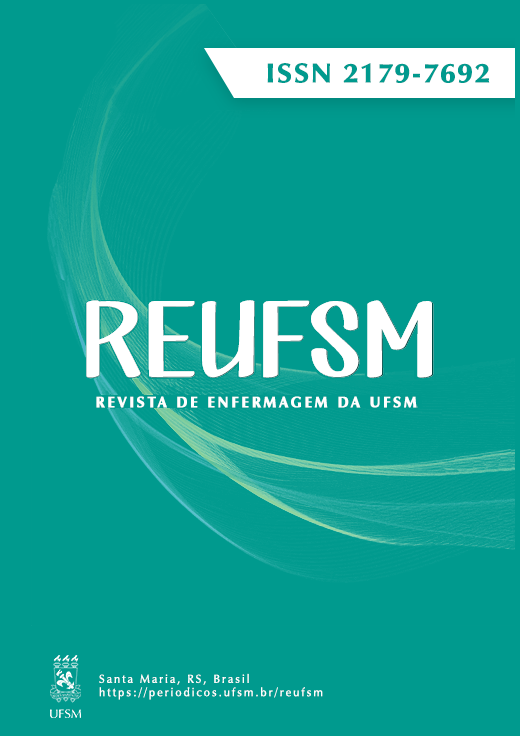Nurses’ Cultural Competence: a scoping review
DOI:
https://doi.org/10.5902/2179769287759Keywords:
Nursing, Healthcare Models, Culturally Competent Care, Cultural Diversity, Professional competenceAbstract
Objective: to map the scientific evidences on the use of the Cultural Competence Nursing Care Model. Method: scoping review, retrieval held in November 2023, in six databases, including primary or secondary studies, in Portuguese, English or Spanish, published from 2002. Results: 11 studies included, six evidenced the use of the model in the context of care-delivery nursing. Conclusion: the Cultural Competence Nursing Care Model is a contributor to the professional development as well as to culturally responsive healthcare services, once its constructs ground nurses’ self-perception as cultural beings, the search for knowledge and skill development on diversified cultures, fostering care encounters permeated by decision-making and professional performance that considers ethnic cultural diversity.
Downloads
References
Young S, Guo KL. Cultural diversity training: the necessity of cultural competence for health care providers and in nursing practice. Health Care Manag (Frederick). 2016;35(2):94-102. doi: 10.1097/HCM.0000000000000100.
Agrazal García J, McLaughlin de Anderson MM, Gordón de Isaacs L. Beneficios del cuidado de enfermería con congruencia cultural en el bienestar y satisfacción del paciente. Rev Cubana Enfermer [Internet]. 2022 jun [acceso 2024 ene 02];38(2):e4218. Disponible en: http://scielo.sld.cu/scielo.php?script=sci_arttext&pid=S0864-03192022000200014&lng=es.
Campinha-Bacote J. The process of cultural competence in the delivery of healthcare services: a model of care. J Transcult Nurs. 2002;13(3):181-4. doi: 10.1177/1045960201300300.
Leininger M, Mcfarland MR. Transcultural nursing, concepts, theories, research, & practice. 3rd ed. New York: McGraw-Hill Education / Medical; 2002.
Coutinho E, Amaral S, Parreira MVBC, Chaves CB, Amaral O, Nelas P. Nurses-puerperal mothers interaction: searching for cultural care. Rev Bras Enferm. 2019;72(4):910-7. doi: 10.1590/0034-7167-2018-0216.
Byrne D. Evaluating cultural competence in undergraduate nursing students using standardized patients. Teach Learn Nurs. 2020;15(1):57-60. doi: 10.1016/j.teln.2019.08.010.
Chen HC, Jensen F, Chung J, Measom G. Exploring faculty perceptions of teaching cultural competence in nursing. Teach Learn Nurs. 2020;15(1):1-6. doi: 10.1016/j.teln.2019.08.003.
Persaud S. Culturally congruent care in radiology nursing. J Radiol Nurs. 2021;40(3):227-31. doi: 10.1016/j.jradnu.2021.06.005.
United Nations (UN). Department of Economic and Social Affairs. The 17 Goals [Internet]. 2022 [cited 2024 Jan 22]. New York (US): UN; 2024. Available from: https://sdgs.un.org/goals.
Taminato M, Fernandes H, Barbosa DA. Nursing and the Sustainable Development Goals (SDGs): an essential commitment. Rev Bras Enferm. 2023;76(6):e760601. doi: 10.1590/0034-7167.2023760601.
Arksey H, O’Malley L. Scoping studies: towards a methodological framework. Int J Soc Res Methodol. 2005;8(1):19-32. doi: 10.1080/1364557032000119616.
Levac D, Colquhoun H, O'Brien KK. Scoping studies: advancing the methodology. Implement Sci. 5:69. doi: 10.1186/1748-5908-5-69.
Peters MD, Godfrey CM, Khalil H, McInerney P, Parker D, Soares CB. Guidance for conducting systematic scoping reviews. Int J Evid Based Healthc. 2015;13(3):141-6. doi: 10.1097/XEB.0000000000000050.
Amendoeira J, Silva MR, Ferreira MR, Dias H. Tutorial revisão sistemática de literatura: a scoping review [Internet]. Santarém (PT): Instituto Politécnico de Santarém; 2021 [acesso em 15 abr 2024]. Disponível em: https://repositorio.ipsantarem.pt/handle/10400.15/3784.
Salvador PTCO, Alves KYA, Costa TD, Lopes RH, Oliveira LV, Rodrigues CCFM. Contribuições da scoping review na produção da área da saúde: reflexões e perspectivas. Rev Enferm Digit Cuid Promoção Saúde. 2021;6:01-8. doi: 10.5935/2446-5682.20210058.
Sanna MC. Os Processos de trabalho em Enfermagem. Rev Bras Enferm. 2007;60(2):221-4. doi: 10.1590/S0034-71672007000200018.
Campesino M. Beyond transculturalism: critiques of cultural education in nursing. J Nurs Educ. 2008;47(7):298-304. doi: 10.3928/01484834-20080701-02.
Pagliuca LMF, Maia ER. Competência para prestar cuidado de enfermagem transcultural à pessoa com deficiência: instrumento de autoavaliação. Rev Bras Enferm. 2012;65(5):849-55. doi: 10.1590/S0034-71672012000500020.
García-Navarro EB, Gualda E. Cuidado transcultural y estrategias familiares ante la dependencia: el fenómeno de los cuidadores extranjeros. Aquichan. 2014;14(4):509-22. doi: 10.5294/aqui.2014.14.4.6.
Tavallali AG, Jirwe M, Kabir ZN. Cross‐cultural care encounters in paediatric care: minority ethnic parents’ experiences. Scand J Caring Sci. 2017;31(1):54-62. doi: 10.1111/scs.12314.
Halabi JO, De Beer J. Exploring the cultural competence of undergraduate nursing students in Saudi Arabia. Nurse Educ Today. 2018;62:9-15. doi: 10.1016/j.nedt.2017.12.005.
Shin M, Na H, Kim S. Enhancing cultural competency and empathy toward foreign patients for Korean nursing students through a simulation: a quasi-experimental study. Nurse Educ Pract. 2023;69:103615. doi: 10.1016/j.nepr.2023.103615.
United States Census Bureau. American Community Survey Updates: 2019 [Internet]. 2019 [cited 2024 May 02]. Available from: https://www.census.gov/programs-surveys/acs/news/updates/2019.html.
Fitzgerald EM, Cronin SN, Campinha-Bacote J. Psychometric testing of the inventory for assessing the process of cultural competence among healthcare professionals - student version (IAPCC-SV©). J Theory Constr Test [Internet]. 2009 [cited 2024 Jan 14];13(2):64-8. Available from: https://search.proquest.com/docview/89253367?pq-origsite%C2%BCsummon.
McEwen M, Wills EM. Bases teóricas de Enfermagem. 4ª ed. Porto Alegre: Artmed; 2016.
Taffner VBM, Pimentel RRS, Almeida DB, Freitas GF, Santos MJ. Teorias e modelos de Enfermagem como referenciais teóricos de teses e dissertações brasileiras: estudo bibliométrico. Rev Bras Enferm. 2022;75(4):e20210201. doi: 10.1590/0034-7167-2021-0201.
Hall S. A identidade cultural na pós-modernidade. 10a ed. Rio de janeiro: DP&A; 2005.
Downloads
Published
How to Cite
Issue
Section
License
Copyright (c) 2024 Revista de Enfermagem da UFSM

This work is licensed under a Creative Commons Attribution 4.0 International License.
This work is licensed under a Creative Commons Attribution-NonCommercial-ShareAlike 4.0 International License.








